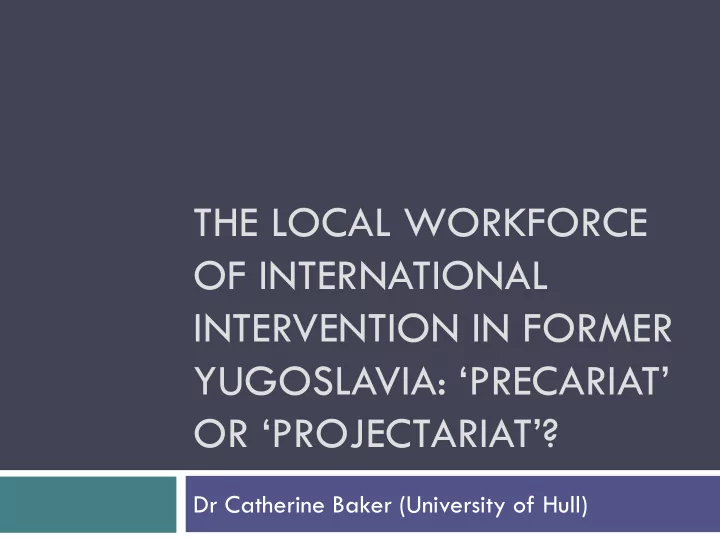

THE LOCAL WORKFORCE OF INTERNATIONAL INTERVENTION IN FORMER YUGOSLAVIA: ‘PRECARIAT’ OR ‘PROJECTARIAT’? Dr Catherine Baker (University of Hull)
‘Precariat’ and ‘projectariat’ ‘Precariat’ From Guy Standing’s The Precariat (2010) A group defined by its experiences of insecurity ‘Projectariat’ Is this a privileged group? Focus: the local workforce of international intervention
Social roles derived from the war Compared to veterans/refugees etc, local employees of international organisations do not have An institutionalised role in society Associations that claim to represent them Representation as protagonists in popular culture (?) Are they another post-conflict/post-socialist social group or class? Where are they in the ‘peacekeeping economy’?
Local staff and precarity ‘Precariousness’ and the desire to overcome it (Jansen) Are there common experiences that help to constitute this workforce as a social group? Where is this in the political economy literature on BiH/Kosovo where sector has been largest?
Advantages: as agents of reconciliation and change? More agency in promoting reconciliation or taking social action because of skills/experience gained through the work? ‘The first to cross the lines’ narrative Economic as well as activist reasons Potential to develop anti-nationalist/post-ethnic orientation? Or only if someone was already predisposed to
Advantages: a socially distinct elite? NGO sector as part of ‘a new globalized professional middle class’ (Stubbs) Continuity with existing Yugoslav urban middle class... ...and all that that entails Not a new class, but reproducing an old one? Access to pre-requisites for jobs was socially stratified But still reproducing itself in novel ways due to the new context
Advantages: power as intermediaries? Gatekeepers of knowledge have power during radical change ‘Local guide’ figures (Scott) Agency of translators/interpreters in Translation Studies How could local staff gain from knowledge they acquired, and from power in framing it to others? What advantages did these posts have in the informal economy?
Questions of identification ‘A new Bosnian [etc] social class’? (Barakat and Kapisazović) Yet employing organisations still thought the group would disappear... But even this raises questions How far have similar experiences and conditions of work created a group identity? Do those to whom this identity refers derive meaning from it, or is it being analytically imposed? Is there even one term for everyone involved? (lokalci?)
Questions of identification Or is there too much difference for this to be one group? Multiple organisational practices and cultures Some jobs provide more resources/strategies for negotiating precarity than others Differences in backgrounds before entering sector Levels of identification with symbolic practices of resistance to nationalism Chronological and geographical variations Impact of post-2008 global financial crisis Evidence base needs to be improved
THE LOCAL WORKFORCE OF INTERNATIONAL INTERVENTION IN FORMER YUGOSLAVIA: ‘PRECARIAT’ OR ‘PROJECTARIAT’? Dr Catherine Baker (University of Hull)
Recommend
More recommend